An Analysis of Entrepreneurship in Business: Report on Ventures
VerifiedAdded on 2020/10/22
|17
|4465
|269
Report
AI Summary
This report on entrepreneurship and small business management explores various types of entrepreneurial ventures, including entrepreneurs, intrapreneurs, and small business owners. It defines entrepreneurship and highlights the characteristics of successful entrepreneurs, such as passion, risk-taking, and adaptability. The report examines the similarities and differences between these venture types, providing insights into their roles and functions within a business context. It analyzes the impact of micro and small businesses on the economy, emphasizing their importance for growth and development. The report also discusses the typology of entrepreneurship, including administrative and independent entrepreneurs, and relates these concepts to real-world examples, such as the founding of Tesco. Overall, the report offers a comprehensive overview of entrepreneurship, its different forms, and its significance in the business world.
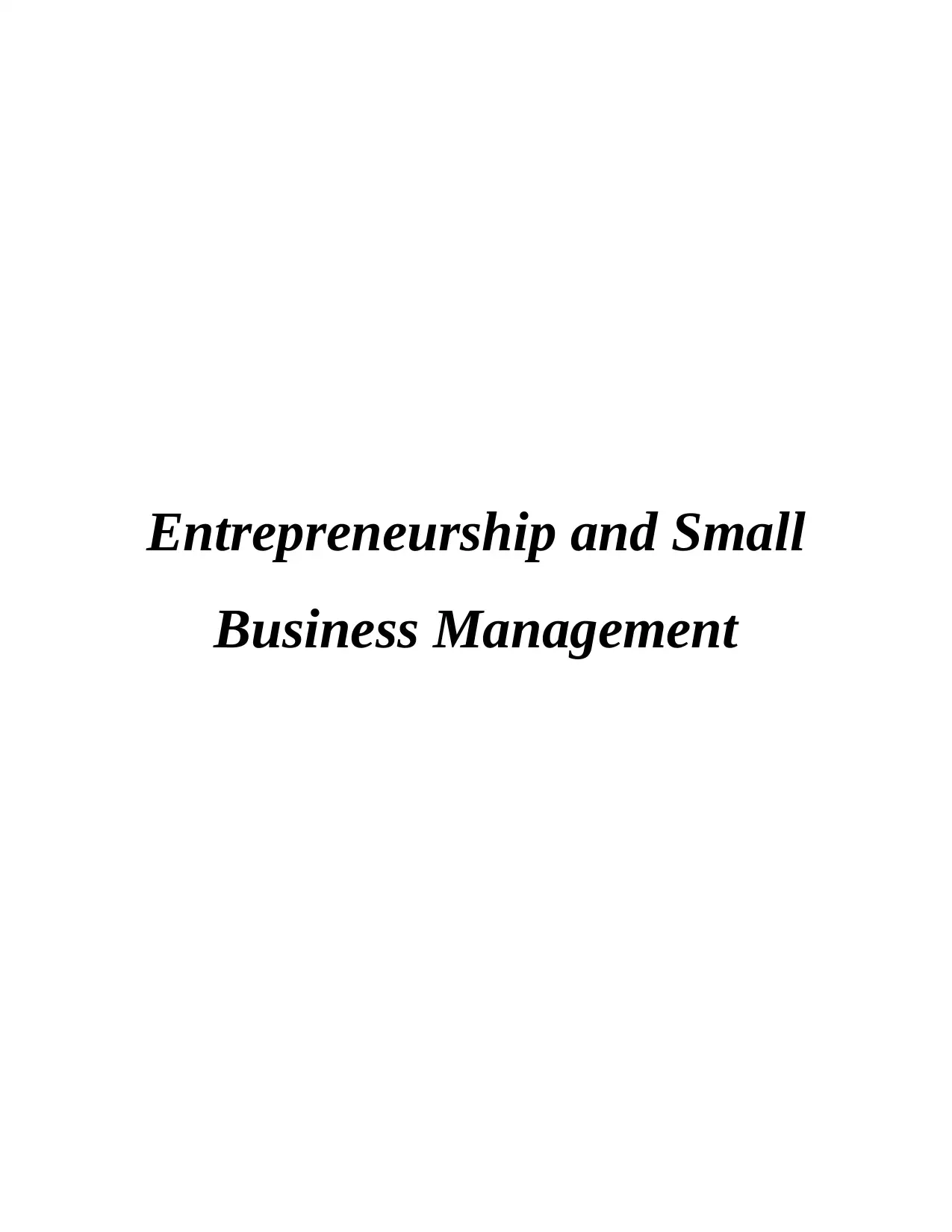
Entrepreneurship and Small
Business Management
Business Management
Paraphrase This Document
Need a fresh take? Get an instant paraphrase of this document with our AI Paraphraser
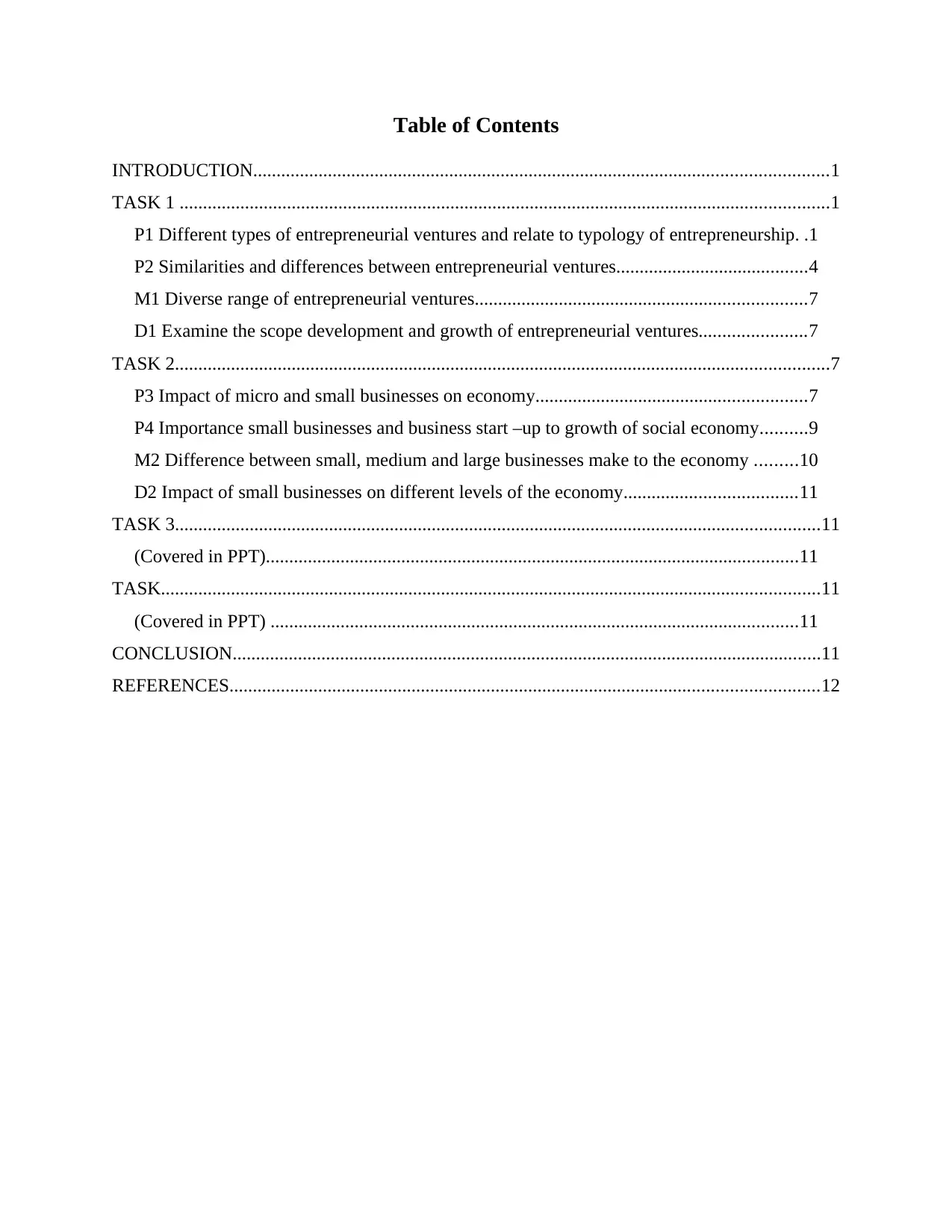
Table of Contents
INTRODUCTION...........................................................................................................................1
TASK 1 ...........................................................................................................................................1
P1 Different types of entrepreneurial ventures and relate to typology of entrepreneurship. .1
P2 Similarities and differences between entrepreneurial ventures.........................................4
M1 Diverse range of entrepreneurial ventures.......................................................................7
D1 Examine the scope development and growth of entrepreneurial ventures.......................7
TASK 2............................................................................................................................................7
P3 Impact of micro and small businesses on economy..........................................................7
P4 Importance small businesses and business start –up to growth of social economy..........9
M2 Difference between small, medium and large businesses make to the economy .........10
D2 Impact of small businesses on different levels of the economy.....................................11
TASK 3..........................................................................................................................................11
(Covered in PPT)..................................................................................................................11
TASK.............................................................................................................................................11
(Covered in PPT) .................................................................................................................11
CONCLUSION..............................................................................................................................11
REFERENCES..............................................................................................................................12
INTRODUCTION...........................................................................................................................1
TASK 1 ...........................................................................................................................................1
P1 Different types of entrepreneurial ventures and relate to typology of entrepreneurship. .1
P2 Similarities and differences between entrepreneurial ventures.........................................4
M1 Diverse range of entrepreneurial ventures.......................................................................7
D1 Examine the scope development and growth of entrepreneurial ventures.......................7
TASK 2............................................................................................................................................7
P3 Impact of micro and small businesses on economy..........................................................7
P4 Importance small businesses and business start –up to growth of social economy..........9
M2 Difference between small, medium and large businesses make to the economy .........10
D2 Impact of small businesses on different levels of the economy.....................................11
TASK 3..........................................................................................................................................11
(Covered in PPT)..................................................................................................................11
TASK.............................................................................................................................................11
(Covered in PPT) .................................................................................................................11
CONCLUSION..............................................................................................................................11
REFERENCES..............................................................................................................................12

⊘ This is a preview!⊘
Do you want full access?
Subscribe today to unlock all pages.

Trusted by 1+ million students worldwide
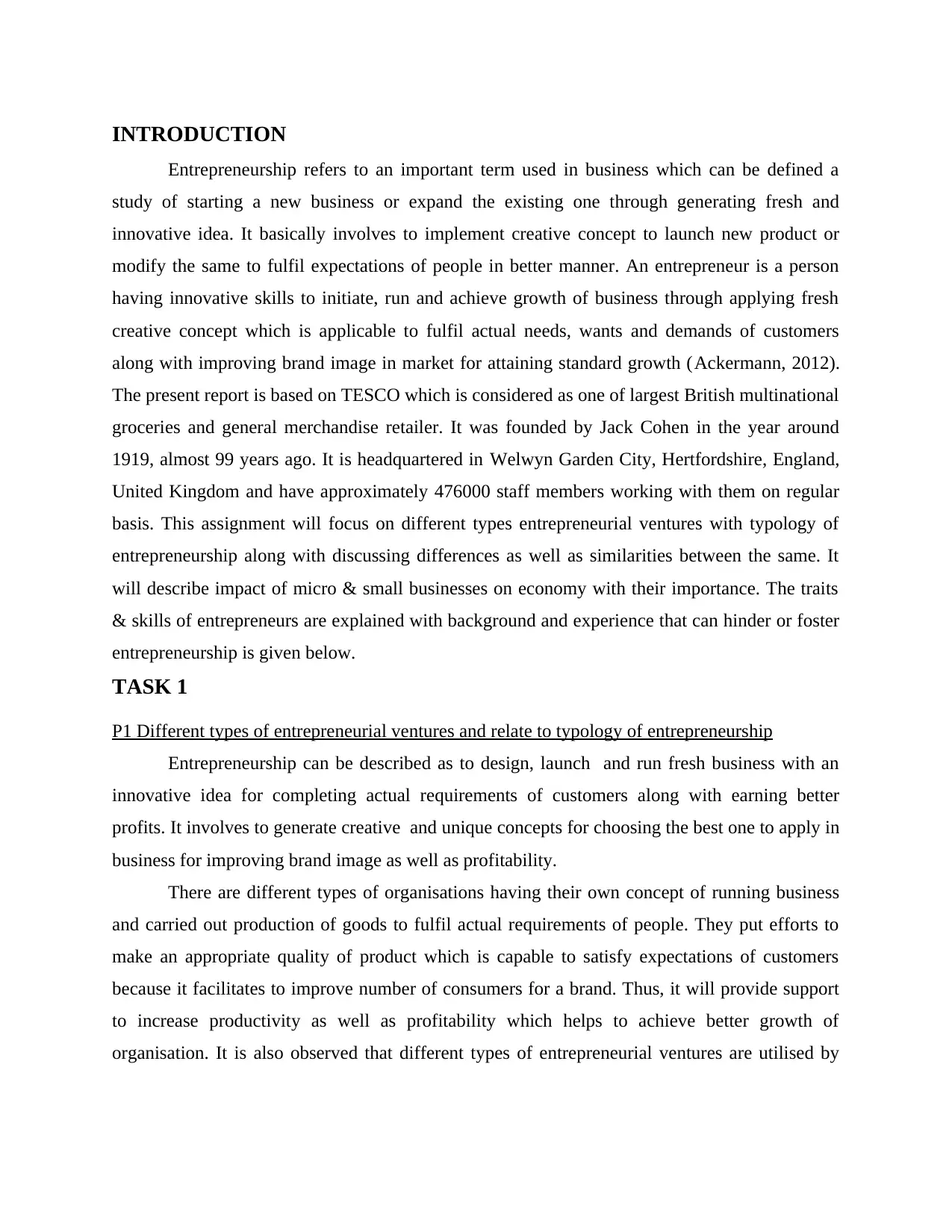
INTRODUCTION
Entrepreneurship refers to an important term used in business which can be defined a
study of starting a new business or expand the existing one through generating fresh and
innovative idea. It basically involves to implement creative concept to launch new product or
modify the same to fulfil expectations of people in better manner. An entrepreneur is a person
having innovative skills to initiate, run and achieve growth of business through applying fresh
creative concept which is applicable to fulfil actual needs, wants and demands of customers
along with improving brand image in market for attaining standard growth (Ackermann, 2012).
The present report is based on TESCO which is considered as one of largest British multinational
groceries and general merchandise retailer. It was founded by Jack Cohen in the year around
1919, almost 99 years ago. It is headquartered in Welwyn Garden City, Hertfordshire, England,
United Kingdom and have approximately 476000 staff members working with them on regular
basis. This assignment will focus on different types entrepreneurial ventures with typology of
entrepreneurship along with discussing differences as well as similarities between the same. It
will describe impact of micro & small businesses on economy with their importance. The traits
& skills of entrepreneurs are explained with background and experience that can hinder or foster
entrepreneurship is given below.
TASK 1
P1 Different types of entrepreneurial ventures and relate to typology of entrepreneurship
Entrepreneurship can be described as to design, launch and run fresh business with an
innovative idea for completing actual requirements of customers along with earning better
profits. It involves to generate creative and unique concepts for choosing the best one to apply in
business for improving brand image as well as profitability.
There are different types of organisations having their own concept of running business
and carried out production of goods to fulfil actual requirements of people. They put efforts to
make an appropriate quality of product which is capable to satisfy expectations of customers
because it facilitates to improve number of consumers for a brand. Thus, it will provide support
to increase productivity as well as profitability which helps to achieve better growth of
organisation. It is also observed that different types of entrepreneurial ventures are utilised by
Entrepreneurship refers to an important term used in business which can be defined a
study of starting a new business or expand the existing one through generating fresh and
innovative idea. It basically involves to implement creative concept to launch new product or
modify the same to fulfil expectations of people in better manner. An entrepreneur is a person
having innovative skills to initiate, run and achieve growth of business through applying fresh
creative concept which is applicable to fulfil actual needs, wants and demands of customers
along with improving brand image in market for attaining standard growth (Ackermann, 2012).
The present report is based on TESCO which is considered as one of largest British multinational
groceries and general merchandise retailer. It was founded by Jack Cohen in the year around
1919, almost 99 years ago. It is headquartered in Welwyn Garden City, Hertfordshire, England,
United Kingdom and have approximately 476000 staff members working with them on regular
basis. This assignment will focus on different types entrepreneurial ventures with typology of
entrepreneurship along with discussing differences as well as similarities between the same. It
will describe impact of micro & small businesses on economy with their importance. The traits
& skills of entrepreneurs are explained with background and experience that can hinder or foster
entrepreneurship is given below.
TASK 1
P1 Different types of entrepreneurial ventures and relate to typology of entrepreneurship
Entrepreneurship can be described as to design, launch and run fresh business with an
innovative idea for completing actual requirements of customers along with earning better
profits. It involves to generate creative and unique concepts for choosing the best one to apply in
business for improving brand image as well as profitability.
There are different types of organisations having their own concept of running business
and carried out production of goods to fulfil actual requirements of people. They put efforts to
make an appropriate quality of product which is capable to satisfy expectations of customers
because it facilitates to improve number of consumers for a brand. Thus, it will provide support
to increase productivity as well as profitability which helps to achieve better growth of
organisation. It is also observed that different types of entrepreneurial ventures are utilised by
Paraphrase This Document
Need a fresh take? Get an instant paraphrase of this document with our AI Paraphraser

companies which are applicable in business to boost up goodwill of brand that facilitates to
achieve more profit share in market. Some of entrepreneurial ventures are given below:
2
achieve more profit share in market. Some of entrepreneurial ventures are given below:
2
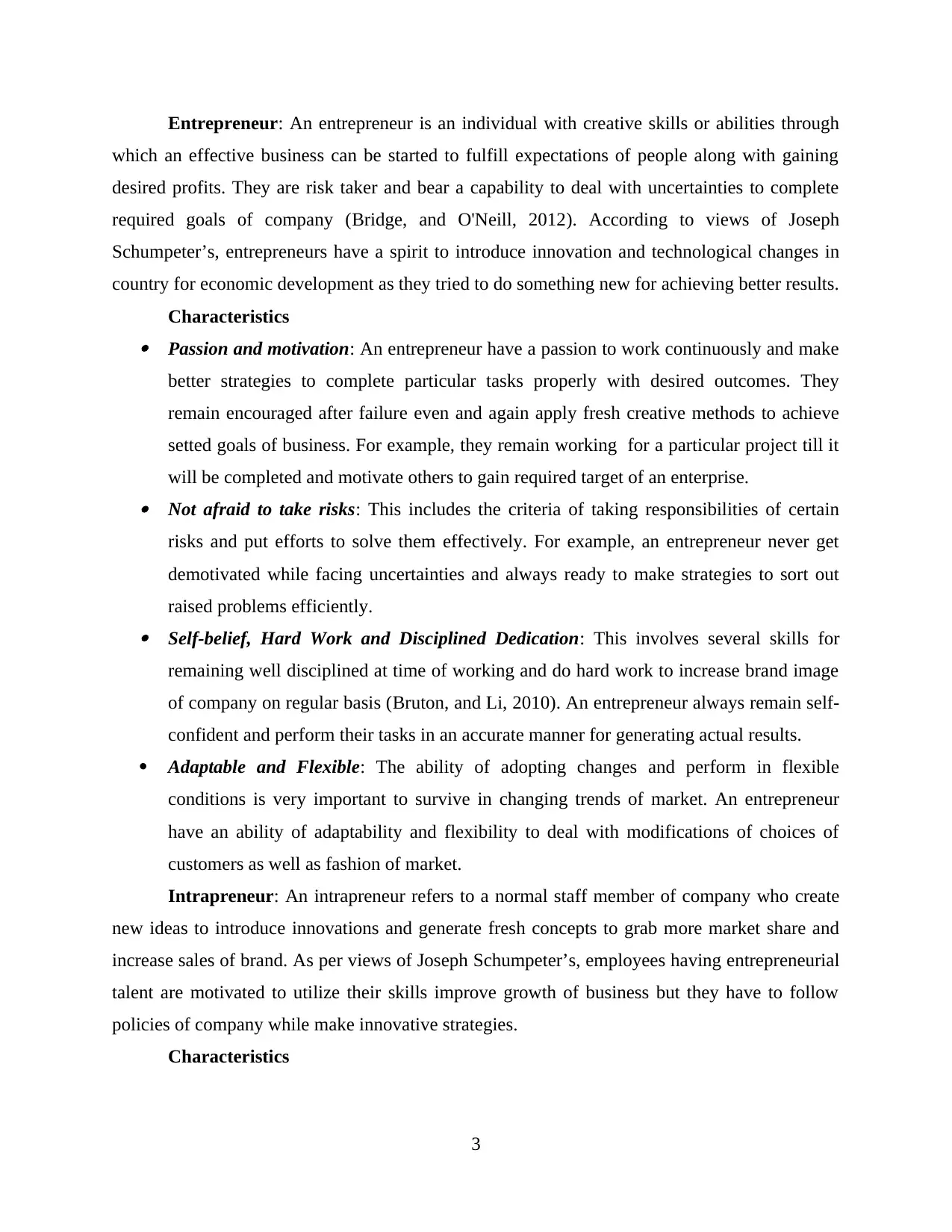
Entrepreneur: An entrepreneur is an individual with creative skills or abilities through
which an effective business can be started to fulfill expectations of people along with gaining
desired profits. They are risk taker and bear a capability to deal with uncertainties to complete
required goals of company (Bridge, and O'Neill, 2012). According to views of Joseph
Schumpeter’s, entrepreneurs have a spirit to introduce innovation and technological changes in
country for economic development as they tried to do something new for achieving better results.
Characteristics Passion and motivation: An entrepreneur have a passion to work continuously and make
better strategies to complete particular tasks properly with desired outcomes. They
remain encouraged after failure even and again apply fresh creative methods to achieve
setted goals of business. For example, they remain working for a particular project till it
will be completed and motivate others to gain required target of an enterprise. Not afraid to take risks: This includes the criteria of taking responsibilities of certain
risks and put efforts to solve them effectively. For example, an entrepreneur never get
demotivated while facing uncertainties and always ready to make strategies to sort out
raised problems efficiently. Self-belief, Hard Work and Disciplined Dedication: This involves several skills for
remaining well disciplined at time of working and do hard work to increase brand image
of company on regular basis (Bruton, and Li, 2010). An entrepreneur always remain self-
confident and perform their tasks in an accurate manner for generating actual results.
Adaptable and Flexible: The ability of adopting changes and perform in flexible
conditions is very important to survive in changing trends of market. An entrepreneur
have an ability of adaptability and flexibility to deal with modifications of choices of
customers as well as fashion of market.
Intrapreneur: An intrapreneur refers to a normal staff member of company who create
new ideas to introduce innovations and generate fresh concepts to grab more market share and
increase sales of brand. As per views of Joseph Schumpeter’s, employees having entrepreneurial
talent are motivated to utilize their skills improve growth of business but they have to follow
policies of company while make innovative strategies.
Characteristics
3
which an effective business can be started to fulfill expectations of people along with gaining
desired profits. They are risk taker and bear a capability to deal with uncertainties to complete
required goals of company (Bridge, and O'Neill, 2012). According to views of Joseph
Schumpeter’s, entrepreneurs have a spirit to introduce innovation and technological changes in
country for economic development as they tried to do something new for achieving better results.
Characteristics Passion and motivation: An entrepreneur have a passion to work continuously and make
better strategies to complete particular tasks properly with desired outcomes. They
remain encouraged after failure even and again apply fresh creative methods to achieve
setted goals of business. For example, they remain working for a particular project till it
will be completed and motivate others to gain required target of an enterprise. Not afraid to take risks: This includes the criteria of taking responsibilities of certain
risks and put efforts to solve them effectively. For example, an entrepreneur never get
demotivated while facing uncertainties and always ready to make strategies to sort out
raised problems efficiently. Self-belief, Hard Work and Disciplined Dedication: This involves several skills for
remaining well disciplined at time of working and do hard work to increase brand image
of company on regular basis (Bruton, and Li, 2010). An entrepreneur always remain self-
confident and perform their tasks in an accurate manner for generating actual results.
Adaptable and Flexible: The ability of adopting changes and perform in flexible
conditions is very important to survive in changing trends of market. An entrepreneur
have an ability of adaptability and flexibility to deal with modifications of choices of
customers as well as fashion of market.
Intrapreneur: An intrapreneur refers to a normal staff member of company who create
new ideas to introduce innovations and generate fresh concepts to grab more market share and
increase sales of brand. As per views of Joseph Schumpeter’s, employees having entrepreneurial
talent are motivated to utilize their skills improve growth of business but they have to follow
policies of company while make innovative strategies.
Characteristics
3
⊘ This is a preview!⊘
Do you want full access?
Subscribe today to unlock all pages.

Trusted by 1+ million students worldwide
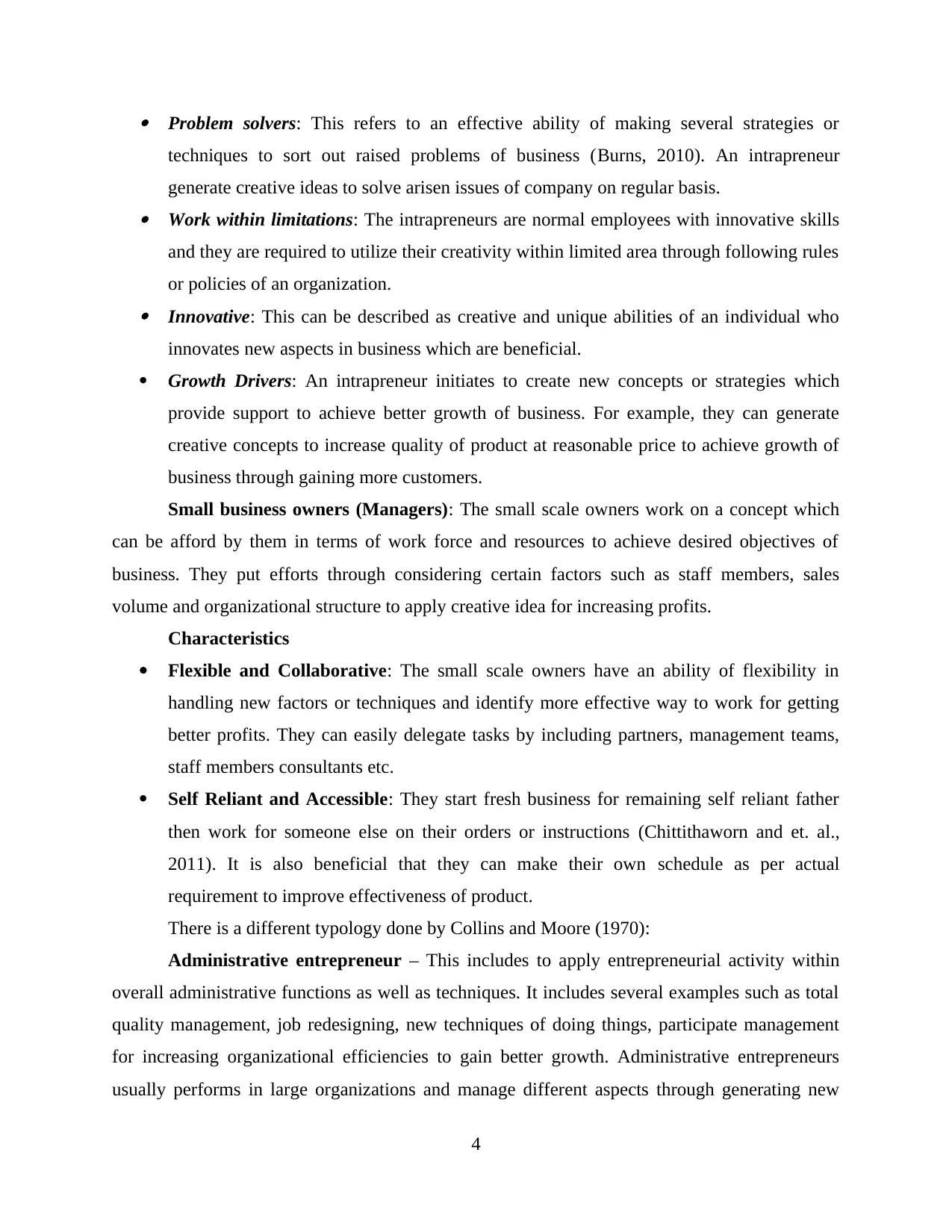
Problem solvers: This refers to an effective ability of making several strategies or
techniques to sort out raised problems of business (Burns, 2010). An intrapreneur
generate creative ideas to solve arisen issues of company on regular basis. Work within limitations: The intrapreneurs are normal employees with innovative skills
and they are required to utilize their creativity within limited area through following rules
or policies of an organization. Innovative: This can be described as creative and unique abilities of an individual who
innovates new aspects in business which are beneficial.
Growth Drivers: An intrapreneur initiates to create new concepts or strategies which
provide support to achieve better growth of business. For example, they can generate
creative concepts to increase quality of product at reasonable price to achieve growth of
business through gaining more customers.
Small business owners (Managers): The small scale owners work on a concept which
can be afford by them in terms of work force and resources to achieve desired objectives of
business. They put efforts through considering certain factors such as staff members, sales
volume and organizational structure to apply creative idea for increasing profits.
Characteristics
Flexible and Collaborative: The small scale owners have an ability of flexibility in
handling new factors or techniques and identify more effective way to work for getting
better profits. They can easily delegate tasks by including partners, management teams,
staff members consultants etc.
Self Reliant and Accessible: They start fresh business for remaining self reliant father
then work for someone else on their orders or instructions (Chittithaworn and et. al.,
2011). It is also beneficial that they can make their own schedule as per actual
requirement to improve effectiveness of product.
There is a different typology done by Collins and Moore (1970):
Administrative entrepreneur – This includes to apply entrepreneurial activity within
overall administrative functions as well as techniques. It includes several examples such as total
quality management, job redesigning, new techniques of doing things, participate management
for increasing organizational efficiencies to gain better growth. Administrative entrepreneurs
usually performs in large organizations and manage different aspects through generating new
4
techniques to sort out raised problems of business (Burns, 2010). An intrapreneur
generate creative ideas to solve arisen issues of company on regular basis. Work within limitations: The intrapreneurs are normal employees with innovative skills
and they are required to utilize their creativity within limited area through following rules
or policies of an organization. Innovative: This can be described as creative and unique abilities of an individual who
innovates new aspects in business which are beneficial.
Growth Drivers: An intrapreneur initiates to create new concepts or strategies which
provide support to achieve better growth of business. For example, they can generate
creative concepts to increase quality of product at reasonable price to achieve growth of
business through gaining more customers.
Small business owners (Managers): The small scale owners work on a concept which
can be afford by them in terms of work force and resources to achieve desired objectives of
business. They put efforts through considering certain factors such as staff members, sales
volume and organizational structure to apply creative idea for increasing profits.
Characteristics
Flexible and Collaborative: The small scale owners have an ability of flexibility in
handling new factors or techniques and identify more effective way to work for getting
better profits. They can easily delegate tasks by including partners, management teams,
staff members consultants etc.
Self Reliant and Accessible: They start fresh business for remaining self reliant father
then work for someone else on their orders or instructions (Chittithaworn and et. al.,
2011). It is also beneficial that they can make their own schedule as per actual
requirement to improve effectiveness of product.
There is a different typology done by Collins and Moore (1970):
Administrative entrepreneur – This includes to apply entrepreneurial activity within
overall administrative functions as well as techniques. It includes several examples such as total
quality management, job redesigning, new techniques of doing things, participate management
for increasing organizational efficiencies to gain better growth. Administrative entrepreneurs
usually performs in large organizations and manage different aspects through generating new
4
Paraphrase This Document
Need a fresh take? Get an instant paraphrase of this document with our AI Paraphraser
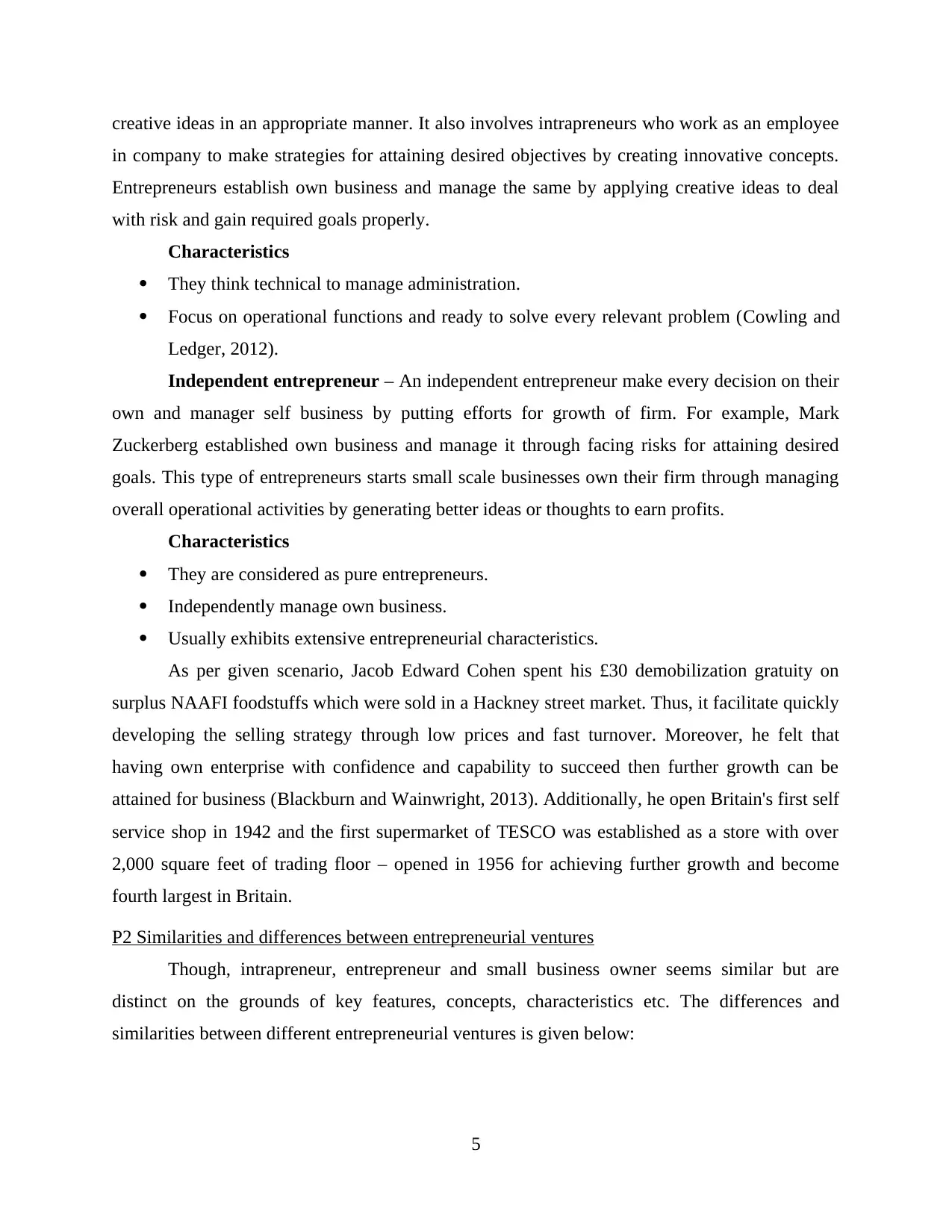
creative ideas in an appropriate manner. It also involves intrapreneurs who work as an employee
in company to make strategies for attaining desired objectives by creating innovative concepts.
Entrepreneurs establish own business and manage the same by applying creative ideas to deal
with risk and gain required goals properly.
Characteristics
They think technical to manage administration.
Focus on operational functions and ready to solve every relevant problem (Cowling and
Ledger, 2012).
Independent entrepreneur – An independent entrepreneur make every decision on their
own and manager self business by putting efforts for growth of firm. For example, Mark
Zuckerberg established own business and manage it through facing risks for attaining desired
goals. This type of entrepreneurs starts small scale businesses own their firm through managing
overall operational activities by generating better ideas or thoughts to earn profits.
Characteristics
They are considered as pure entrepreneurs.
Independently manage own business.
Usually exhibits extensive entrepreneurial characteristics.
As per given scenario, Jacob Edward Cohen spent his £30 demobilization gratuity on
surplus NAAFI foodstuffs which were sold in a Hackney street market. Thus, it facilitate quickly
developing the selling strategy through low prices and fast turnover. Moreover, he felt that
having own enterprise with confidence and capability to succeed then further growth can be
attained for business (Blackburn and Wainwright, 2013). Additionally, he open Britain's first self
service shop in 1942 and the first supermarket of TESCO was established as a store with over
2,000 square feet of trading floor – opened in 1956 for achieving further growth and become
fourth largest in Britain.
P2 Similarities and differences between entrepreneurial ventures
Though, intrapreneur, entrepreneur and small business owner seems similar but are
distinct on the grounds of key features, concepts, characteristics etc. The differences and
similarities between different entrepreneurial ventures is given below:
5
in company to make strategies for attaining desired objectives by creating innovative concepts.
Entrepreneurs establish own business and manage the same by applying creative ideas to deal
with risk and gain required goals properly.
Characteristics
They think technical to manage administration.
Focus on operational functions and ready to solve every relevant problem (Cowling and
Ledger, 2012).
Independent entrepreneur – An independent entrepreneur make every decision on their
own and manager self business by putting efforts for growth of firm. For example, Mark
Zuckerberg established own business and manage it through facing risks for attaining desired
goals. This type of entrepreneurs starts small scale businesses own their firm through managing
overall operational activities by generating better ideas or thoughts to earn profits.
Characteristics
They are considered as pure entrepreneurs.
Independently manage own business.
Usually exhibits extensive entrepreneurial characteristics.
As per given scenario, Jacob Edward Cohen spent his £30 demobilization gratuity on
surplus NAAFI foodstuffs which were sold in a Hackney street market. Thus, it facilitate quickly
developing the selling strategy through low prices and fast turnover. Moreover, he felt that
having own enterprise with confidence and capability to succeed then further growth can be
attained for business (Blackburn and Wainwright, 2013). Additionally, he open Britain's first self
service shop in 1942 and the first supermarket of TESCO was established as a store with over
2,000 square feet of trading floor – opened in 1956 for achieving further growth and become
fourth largest in Britain.
P2 Similarities and differences between entrepreneurial ventures
Though, intrapreneur, entrepreneur and small business owner seems similar but are
distinct on the grounds of key features, concepts, characteristics etc. The differences and
similarities between different entrepreneurial ventures is given below:
5
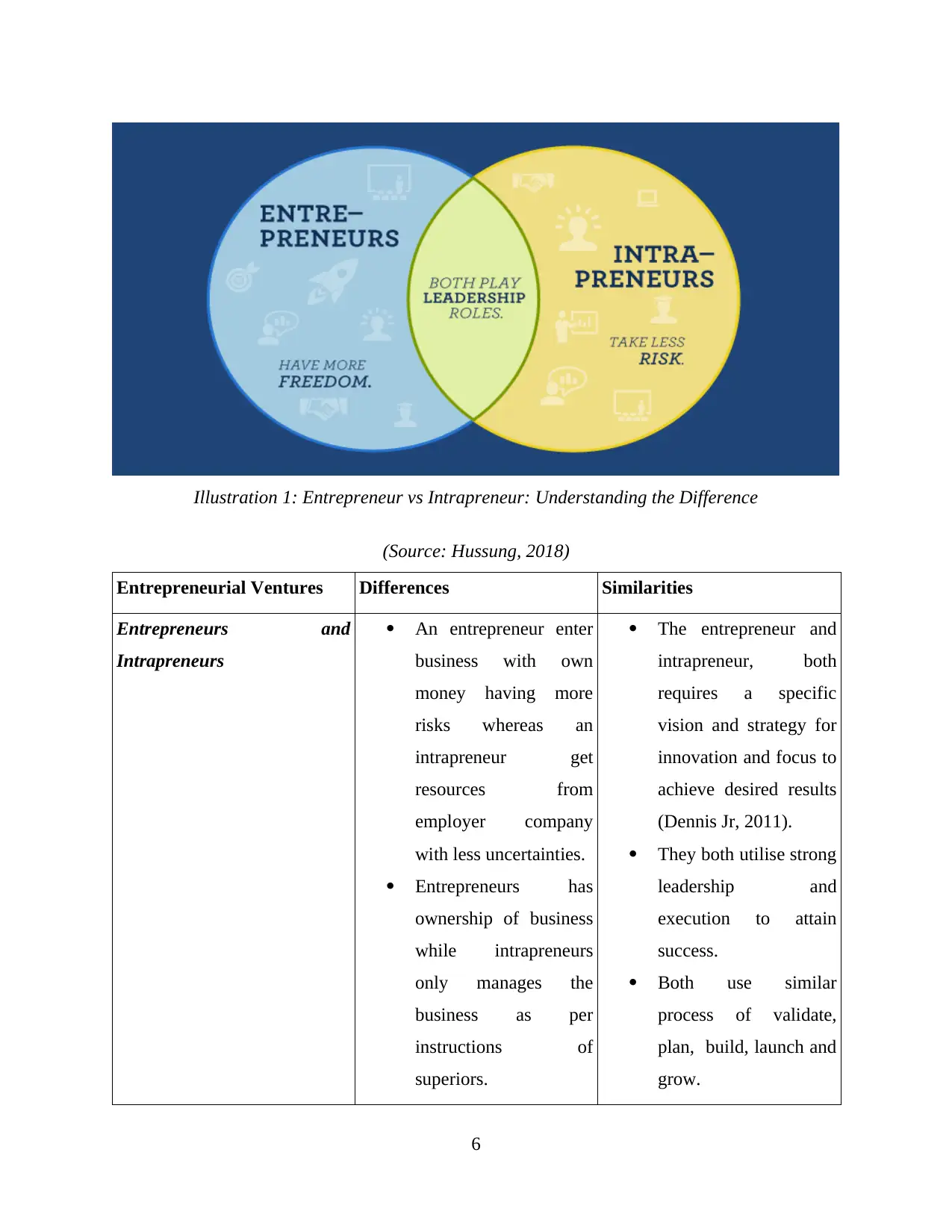
(Source: Hussung, 2018)
Entrepreneurial Ventures Differences Similarities
Entrepreneurs and
Intrapreneurs
An entrepreneur enter
business with own
money having more
risks whereas an
intrapreneur get
resources from
employer company
with less uncertainties.
Entrepreneurs has
ownership of business
while intrapreneurs
only manages the
business as per
instructions of
superiors.
The entrepreneur and
intrapreneur, both
requires a specific
vision and strategy for
innovation and focus to
achieve desired results
(Dennis Jr, 2011).
They both utilise strong
leadership and
execution to attain
success.
Both use similar
process of validate,
plan, build, launch and
grow.
6
Illustration 1: Entrepreneur vs Intrapreneur: Understanding the Difference
Entrepreneurial Ventures Differences Similarities
Entrepreneurs and
Intrapreneurs
An entrepreneur enter
business with own
money having more
risks whereas an
intrapreneur get
resources from
employer company
with less uncertainties.
Entrepreneurs has
ownership of business
while intrapreneurs
only manages the
business as per
instructions of
superiors.
The entrepreneur and
intrapreneur, both
requires a specific
vision and strategy for
innovation and focus to
achieve desired results
(Dennis Jr, 2011).
They both utilise strong
leadership and
execution to attain
success.
Both use similar
process of validate,
plan, build, launch and
grow.
6
Illustration 1: Entrepreneur vs Intrapreneur: Understanding the Difference
⊘ This is a preview!⊘
Do you want full access?
Subscribe today to unlock all pages.

Trusted by 1+ million students worldwide
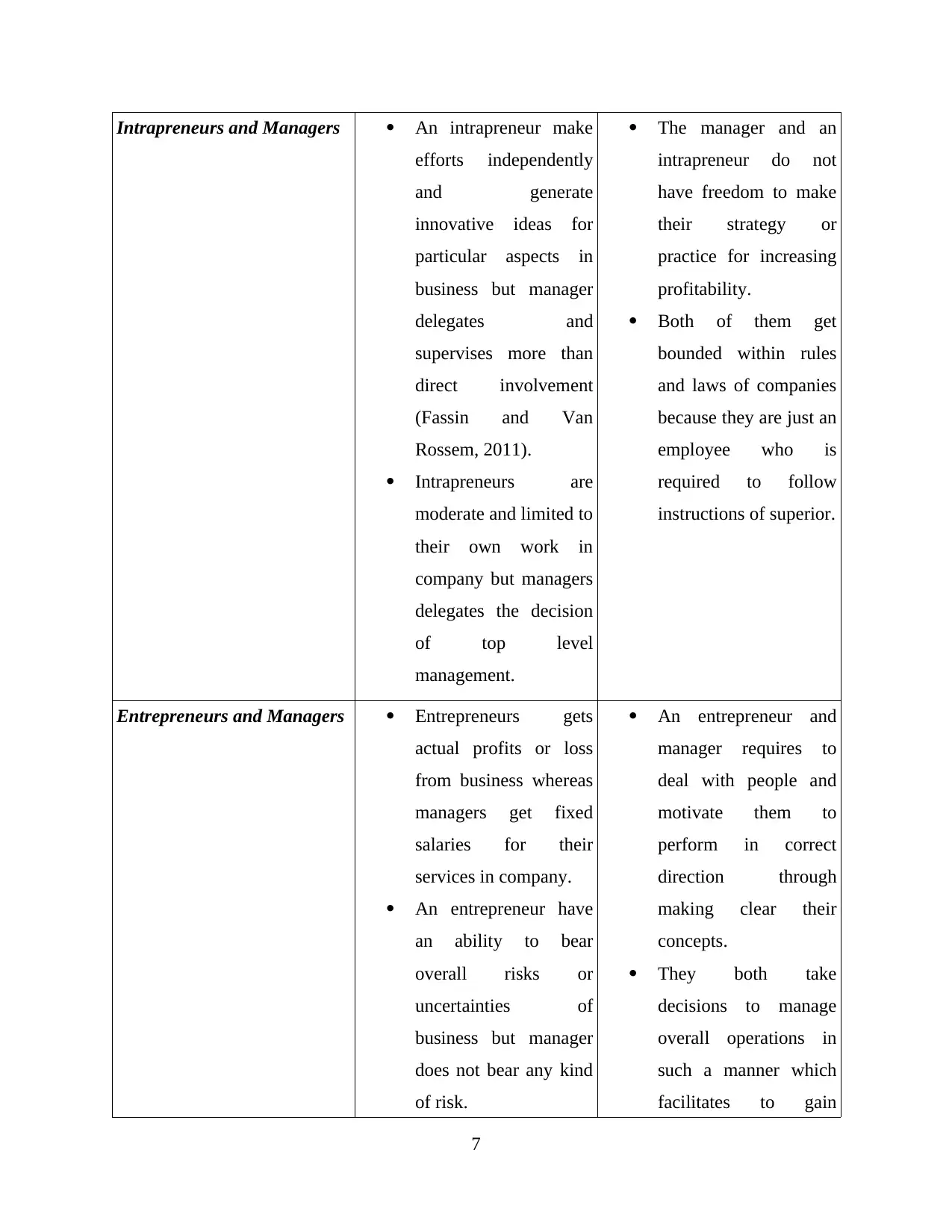
Intrapreneurs and Managers An intrapreneur make
efforts independently
and generate
innovative ideas for
particular aspects in
business but manager
delegates and
supervises more than
direct involvement
(Fassin and Van
Rossem, 2011).
Intrapreneurs are
moderate and limited to
their own work in
company but managers
delegates the decision
of top level
management.
The manager and an
intrapreneur do not
have freedom to make
their strategy or
practice for increasing
profitability.
Both of them get
bounded within rules
and laws of companies
because they are just an
employee who is
required to follow
instructions of superior.
Entrepreneurs and Managers Entrepreneurs gets
actual profits or loss
from business whereas
managers get fixed
salaries for their
services in company.
An entrepreneur have
an ability to bear
overall risks or
uncertainties of
business but manager
does not bear any kind
of risk.
An entrepreneur and
manager requires to
deal with people and
motivate them to
perform in correct
direction through
making clear their
concepts.
They both take
decisions to manage
overall operations in
such a manner which
facilitates to gain
7
efforts independently
and generate
innovative ideas for
particular aspects in
business but manager
delegates and
supervises more than
direct involvement
(Fassin and Van
Rossem, 2011).
Intrapreneurs are
moderate and limited to
their own work in
company but managers
delegates the decision
of top level
management.
The manager and an
intrapreneur do not
have freedom to make
their strategy or
practice for increasing
profitability.
Both of them get
bounded within rules
and laws of companies
because they are just an
employee who is
required to follow
instructions of superior.
Entrepreneurs and Managers Entrepreneurs gets
actual profits or loss
from business whereas
managers get fixed
salaries for their
services in company.
An entrepreneur have
an ability to bear
overall risks or
uncertainties of
business but manager
does not bear any kind
of risk.
An entrepreneur and
manager requires to
deal with people and
motivate them to
perform in correct
direction through
making clear their
concepts.
They both take
decisions to manage
overall operations in
such a manner which
facilitates to gain
7
Paraphrase This Document
Need a fresh take? Get an instant paraphrase of this document with our AI Paraphraser
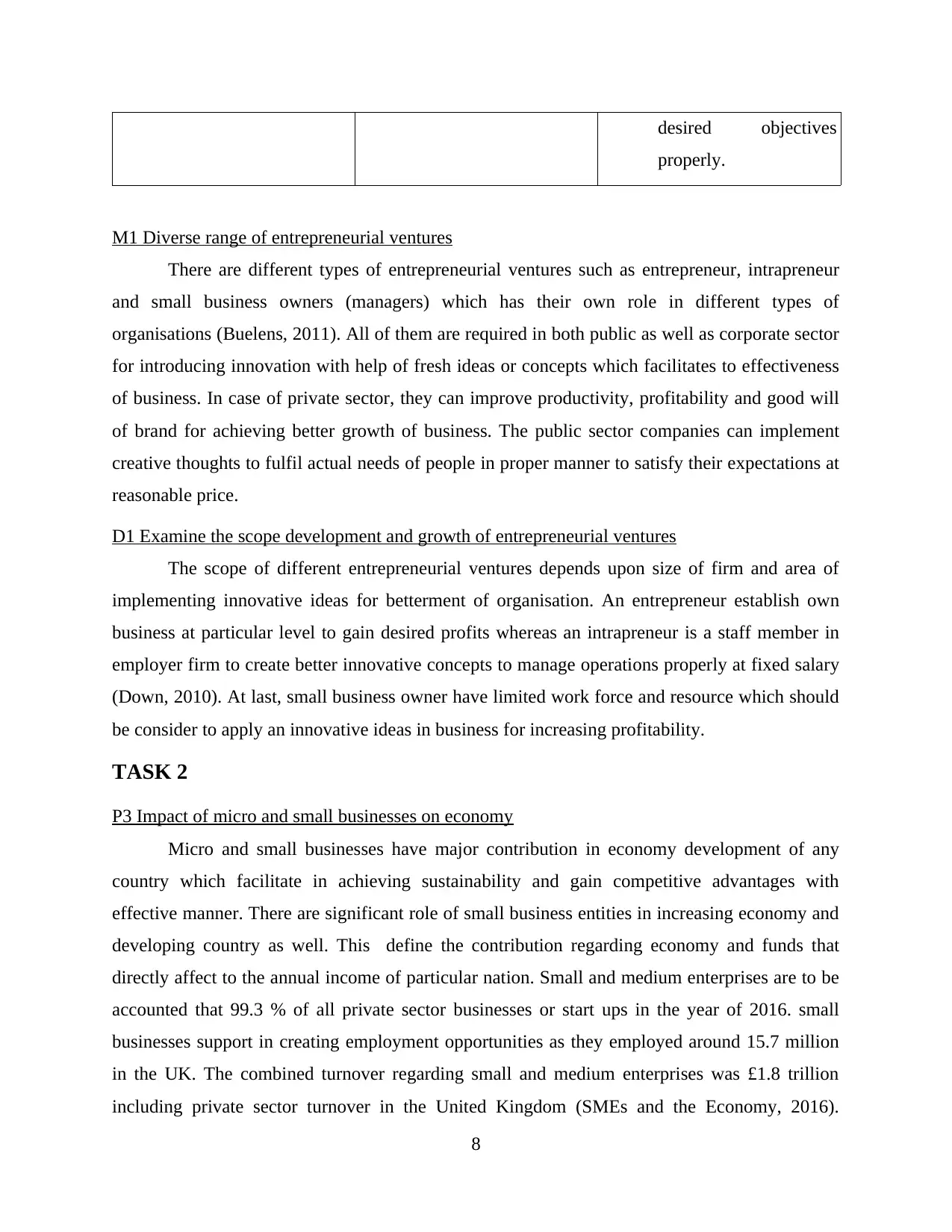
desired objectives
properly.
M1 Diverse range of entrepreneurial ventures
There are different types of entrepreneurial ventures such as entrepreneur, intrapreneur
and small business owners (managers) which has their own role in different types of
organisations (Buelens, 2011). All of them are required in both public as well as corporate sector
for introducing innovation with help of fresh ideas or concepts which facilitates to effectiveness
of business. In case of private sector, they can improve productivity, profitability and good will
of brand for achieving better growth of business. The public sector companies can implement
creative thoughts to fulfil actual needs of people in proper manner to satisfy their expectations at
reasonable price.
D1 Examine the scope development and growth of entrepreneurial ventures
The scope of different entrepreneurial ventures depends upon size of firm and area of
implementing innovative ideas for betterment of organisation. An entrepreneur establish own
business at particular level to gain desired profits whereas an intrapreneur is a staff member in
employer firm to create better innovative concepts to manage operations properly at fixed salary
(Down, 2010). At last, small business owner have limited work force and resource which should
be consider to apply an innovative ideas in business for increasing profitability.
TASK 2
P3 Impact of micro and small businesses on economy
Micro and small businesses have major contribution in economy development of any
country which facilitate in achieving sustainability and gain competitive advantages with
effective manner. There are significant role of small business entities in increasing economy and
developing country as well. This define the contribution regarding economy and funds that
directly affect to the annual income of particular nation. Small and medium enterprises are to be
accounted that 99.3 % of all private sector businesses or start ups in the year of 2016. small
businesses support in creating employment opportunities as they employed around 15.7 million
in the UK. The combined turnover regarding small and medium enterprises was £1.8 trillion
including private sector turnover in the United Kingdom (SMEs and the Economy, 2016).
8
properly.
M1 Diverse range of entrepreneurial ventures
There are different types of entrepreneurial ventures such as entrepreneur, intrapreneur
and small business owners (managers) which has their own role in different types of
organisations (Buelens, 2011). All of them are required in both public as well as corporate sector
for introducing innovation with help of fresh ideas or concepts which facilitates to effectiveness
of business. In case of private sector, they can improve productivity, profitability and good will
of brand for achieving better growth of business. The public sector companies can implement
creative thoughts to fulfil actual needs of people in proper manner to satisfy their expectations at
reasonable price.
D1 Examine the scope development and growth of entrepreneurial ventures
The scope of different entrepreneurial ventures depends upon size of firm and area of
implementing innovative ideas for betterment of organisation. An entrepreneur establish own
business at particular level to gain desired profits whereas an intrapreneur is a staff member in
employer firm to create better innovative concepts to manage operations properly at fixed salary
(Down, 2010). At last, small business owner have limited work force and resource which should
be consider to apply an innovative ideas in business for increasing profitability.
TASK 2
P3 Impact of micro and small businesses on economy
Micro and small businesses have major contribution in economy development of any
country which facilitate in achieving sustainability and gain competitive advantages with
effective manner. There are significant role of small business entities in increasing economy and
developing country as well. This define the contribution regarding economy and funds that
directly affect to the annual income of particular nation. Small and medium enterprises are to be
accounted that 99.3 % of all private sector businesses or start ups in the year of 2016. small
businesses support in creating employment opportunities as they employed around 15.7 million
in the UK. The combined turnover regarding small and medium enterprises was £1.8 trillion
including private sector turnover in the United Kingdom (SMEs and the Economy, 2016).
8
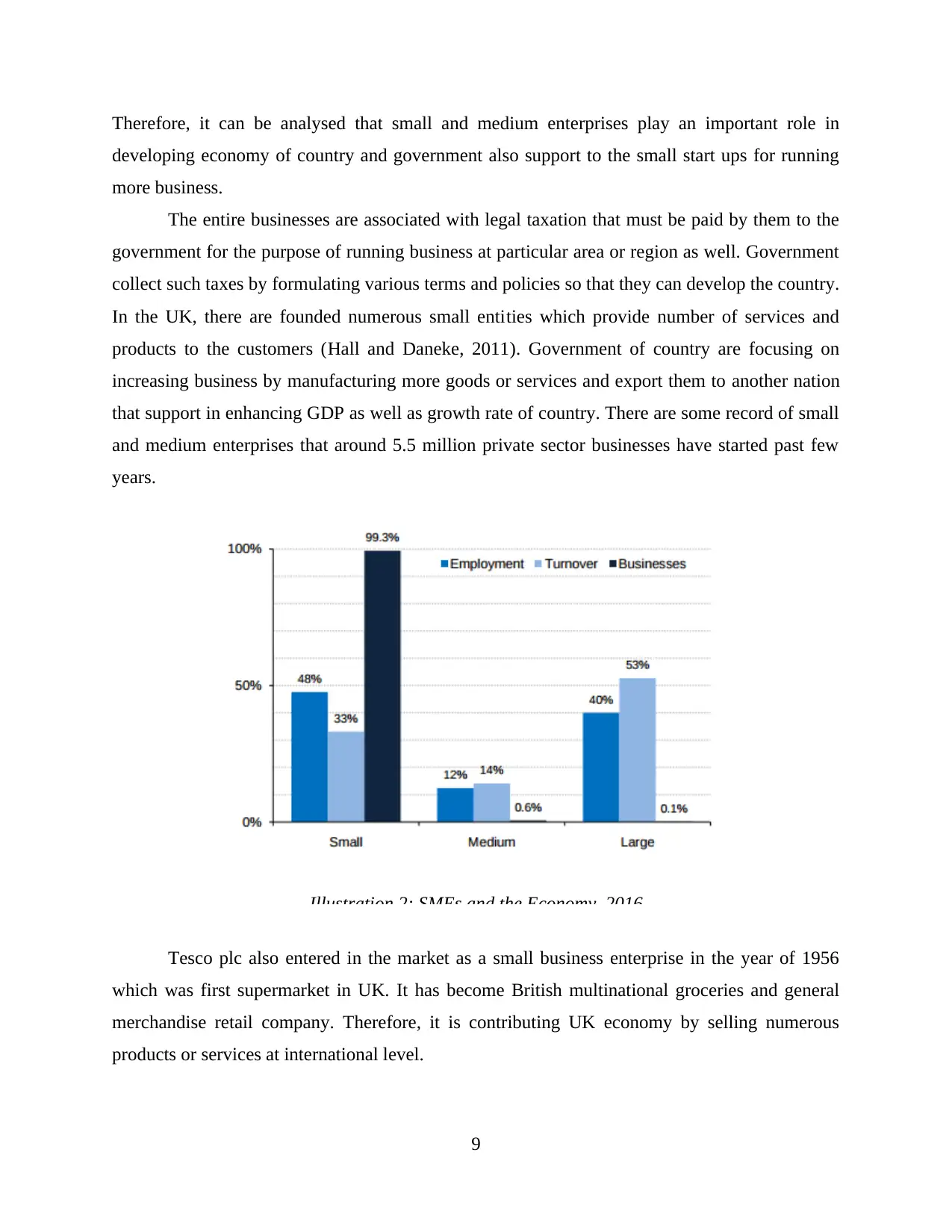
Therefore, it can be analysed that small and medium enterprises play an important role in
developing economy of country and government also support to the small start ups for running
more business.
The entire businesses are associated with legal taxation that must be paid by them to the
government for the purpose of running business at particular area or region as well. Government
collect such taxes by formulating various terms and policies so that they can develop the country.
In the UK, there are founded numerous small entities which provide number of services and
products to the customers (Hall and Daneke, 2011). Government of country are focusing on
increasing business by manufacturing more goods or services and export them to another nation
that support in enhancing GDP as well as growth rate of country. There are some record of small
and medium enterprises that around 5.5 million private sector businesses have started past few
years.
Tesco plc also entered in the market as a small business enterprise in the year of 1956
which was first supermarket in UK. It has become British multinational groceries and general
merchandise retail company. Therefore, it is contributing UK economy by selling numerous
products or services at international level.
9
Illustration 2: SMEs and the Economy, 2016
developing economy of country and government also support to the small start ups for running
more business.
The entire businesses are associated with legal taxation that must be paid by them to the
government for the purpose of running business at particular area or region as well. Government
collect such taxes by formulating various terms and policies so that they can develop the country.
In the UK, there are founded numerous small entities which provide number of services and
products to the customers (Hall and Daneke, 2011). Government of country are focusing on
increasing business by manufacturing more goods or services and export them to another nation
that support in enhancing GDP as well as growth rate of country. There are some record of small
and medium enterprises that around 5.5 million private sector businesses have started past few
years.
Tesco plc also entered in the market as a small business enterprise in the year of 1956
which was first supermarket in UK. It has become British multinational groceries and general
merchandise retail company. Therefore, it is contributing UK economy by selling numerous
products or services at international level.
9
Illustration 2: SMEs and the Economy, 2016
⊘ This is a preview!⊘
Do you want full access?
Subscribe today to unlock all pages.

Trusted by 1+ million students worldwide
1 out of 17
Related Documents
Your All-in-One AI-Powered Toolkit for Academic Success.
+13062052269
info@desklib.com
Available 24*7 on WhatsApp / Email
![[object Object]](/_next/static/media/star-bottom.7253800d.svg)
Unlock your academic potential
Copyright © 2020–2026 A2Z Services. All Rights Reserved. Developed and managed by ZUCOL.





